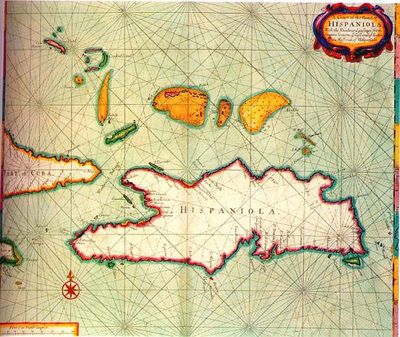Dominican Republic: The Financial Cost of Undocumented Haitian Immigrants
The countries of the Dominican Republic and Haiti share the same island, which has commonly been known as Hispaniola ever since its discovery by Christopher Columbus in 1492. During that time, the island was compromised of the same territory and remained that way until 1697, with the signing of the Treaty of Ryswick, Spain ceded the western part of the island to France, which was renamed Saint-Domingue.

Map of Hispaniola. From Traveling Man's Flickr and used under a Creative Commons license. http://www.flickr.com/photos/travelingman/2816126909/
This colony was gradually populated by African slaves, and who eventually rebelled against their French colonizers. It was in this manner in 1804 that Haiti was born, becoming the first independent country in Latin America. By 1822, Haiti had total control of the island and occupied Santo Domingo until February 27, 1844, when a secret society called “La Trinitaria” led by among others, Juan Pablo Duarte, was created to gain independence from Haiti and to create what is now the Dominican Republic.
Since that day, the Dominican Republic and Haiti have been two independent nations, with a different culture, beliefs, and system. Their paths of economic development has also varied greatly, with Haiti being the least developed country in the Americas and the Dominican Republic enjoys one of the largest economies in the Caribbean and Central America.
Despite these stark contrasts, it is the close proximity of these two countries that have the intertwined their own fates. A large number of Haitians cross the border on a daily basis, usually illegally, to look for work as construction workers or to work as street vendors selling fruit, candy or other small, inexpensive items. Others may be specially contracted to work on sugarcane plantations.
Haitian fruit vendor in the Dominican Republic. Photo by Caymang and used under a Creative Commons license. http://www.flickr.com/photos/dlakme/2903770065/
Due to the large numbers of undocumented Haitians in the Dominican Republic, a large percentage can be seen in the streets as beggars. These visible examples often leaves Dominicans with a negative stereotyped view of all Haitians. However, there is still a smaller percentage that arrive legally with intentions to study, often with scholarships, but may not be the typical profile of Haitans in the country. José Rafael Sosa introduces his readers to one of these successful students, named Gessy [es]:
Cuando uno conoce a Gessy, el esquema prejuiciado que tenemos de “los haitianos”, se va a casa del carajo. Gessy Bellerive nació en Grande Riviѐre Du Nord, cerca de la ciudad de Cabo Haitiano, y voy directo a la historia: acaba de graduarse Magna Cum Laude en la Pontificia Universidad Católica Madre y Maestra. Ahora regresa a Haití a servir a su pueblo.
Despite these positive examples of Haitians excelling in their neighboring countries, many Dominicans feel that immigration is out of control. Even though most arrive out of their free will, there are others that are brought to the Dominican Republic due to human trafficking and are taken advantage of in a network of beggars. There are estimates that there are approximately 1 million undocumented Haitians in the D.R., many of which are children who are working on the streets as window washers or shoeshiners. Manuel Vólquez of Diario Digital Dominicano [es] summarizes the situation this way:
Los haitianos se desplazan por el país como hormigas y han desplazado a nuestros obreros en sectores importantes de la economía como son la construcción y los negocios informales. Han llegado tan lejos que hasta usan niños en las avenidas para mendigar, han asimilado nuestra cultura y nuestras costumbres. ¿Cosas de la transculturización y la globalización?
It is the economic impact on the Dominican State that worries many people, because of the funds destined to provide free medical care to the undocumented immigrants. There are cases where the number of beds available for patients are decreasing because they are often occupied by immigrants [es]. According to Dr. Bolívar Matos, the Health Director of the South Region, the cost to provide medical care to these immigrants in the San Juan and Elías Piña provinces [es]reached 55 million pesos (approximately 1.5 million dollars).
In the comments section of the Hoy article, many write about these increased costs. Rosado320 wonders how much the total cost on the entire island would be, since the estimates only included two provinces. Oscar Caceres thinks that taxes may need to be increased in order to meet these needs, and even suggests asking for international aid to help cover these costs. However, Davidlebron is a little more sympathetic and writes:
A nosotros los dominicanos ausentes, no se nos niega la atencion medica por estos paises tampoco…asi que estoy un poco sorprendido porque hay gente que considera que tratar a los hermanos haitianos es un problema. Claro que es costoso…pero a ninún humano se le debe negar el derecho a comer y ser atendido por probemas de salud…a muchos de nuestros niños se les atiende en hospitales del extranjero y nadie sale a relucir esto como si de algo negativo se tratara.
These topics are often at the center of the discussion about Haitians in the Dominican Republic. As a result, Dominicans are often accused internationally of racism, abuse and mistreatment against the Haitian people, especially in the sugar industry. There are also outcries about the rights of Haitians when the Dominican Republic takes sovereign actions including deportation. There are non-governmental organizations that are active in these types of campaigns, and this is a topic that will be explored in the next article.